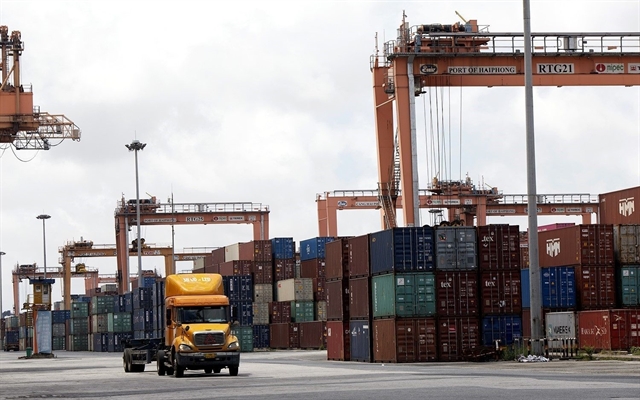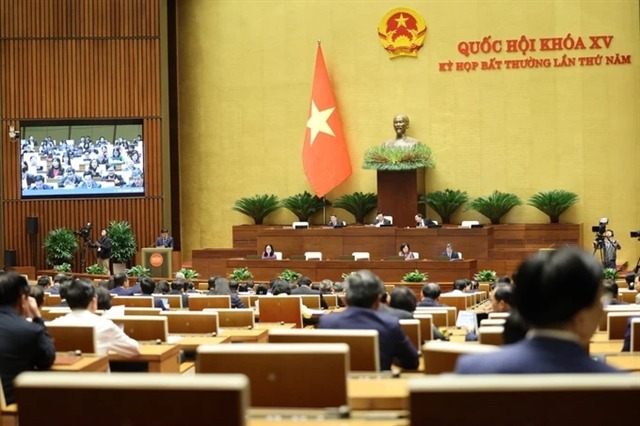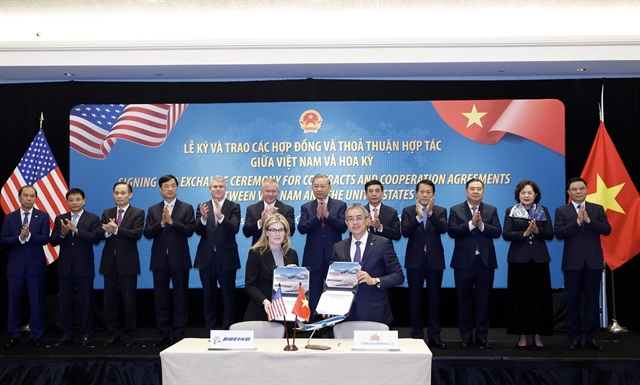 Economy
Economy


|
| NA deputies during the NA's extraordinary general meeting in Hà Nội on January 15. VNA/VNS Photo |
HÀ NỘI The amended Law on Credit Institutions aims to enhance the autonomy and responsibility of credit institutions (CIs), strengthen the resilience of the CI system and improve the supervision, inspection and monitoring of Việt Nam's banking sector, said Chairman of the National Assembly's Economic Committee Vũ Hồng Thanh during the NA's extraordinary general meeting in Hà Nội on Monday.
The amended law stipulated that before the end of the fiscal year, CIs and foreign bank branches must choose an independent audit organisation that meets the requirements set by the Governor of the State Bank of Vietnam (SBV) to audit financial reports and conduct internal control audits for the presentation of financial reports in the following fiscal year.
Regarding delegation and agency operations, the NA's Standing Committee added new provisions allowing "Commercial banks may act as insurance agents following insurance business laws, in line with the scope of insurance agency activities specified by the Governor of the SBV."
For regulations on credit limits, the NA Standing Committee approved a detailed roadmap with a gradual reduction in credit limits over five years from the effective date of the law until 2029. This aims to ensure transparency and clarity while avoiding sudden impacts on the operations of CIs and foreign bank branches, yet still limiting the concentration of credit to a single customer or group of customers and increasing credit access for different customer groups.
Regarding provisions for risks, the NA Standing Committee referred to the government's regulation of the level of risk provision, methods of risk provision and the use of provisions to handle risks in CIs' operations and foreign bank branches. Due to the complexity of accounting and corporate income tax regulations, input from other relevant ministries and agencies is required.
In the case of early intervention in CIs and foreign bank branches, the NA Standing Committee said that the SBV is responsible for reviewing and deciding on early intervention if and when it is required. This includes cases where the accumulated losses of CIs or foreign bank branches exceed 15 per cent of the value of charter capital, contributed capital, and reserves recorded in the latest audited financial statements, or based on the conclusions of inspections and audits by competent state agencies, and violations of the minimum capital adequacy ratio.
The SBV has been given the authority to conduct reviews and decide to place CIs under special control, according to the amended law.
"To ensure the safety of the CI system, public order, and social safety when dealing with CIs under special control, the Government decides on the application of special measures based on the proposal of the SBV and reports to the National Assembly at its nearest session," said the NA Standing Commmittee in a statement.
In addition, the amended law allowed the SBV to inspect, audit, and supervise credit institutions, foreign bank branches, and representative offices of foreign banks under current laws and regulations.
Meanwhile, the NA Standing Committee demanded that the Government, SBV, the Government Inspectorate and ministries continue to propose solutions to enhance and improve the effectiveness of inspection, audit, and supervision activities, ensuring the healthy operation of CIs and the effectiveness of the law when enacted.
After the adoption of the amendments, the law consisted of 15 chapters and 210 articles. It is anticipated that the law will come into effect on January 1, 2025. VNS




